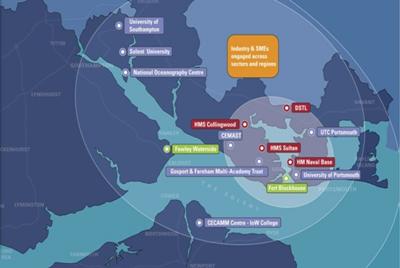Future Skills Requirements for a Global Centre of Maritime Training and Education: Skills Challenges for the Solent

It is well known that marine and maritime (M&M) industries are undergoing technological and environmental transitions that have far-reaching implications for education, training and skills. Digitization and automation; the drive for greater environmental sustainability; and global competition and upgrading into more knowledge intensive activities mean that new skills in IT digital and mechanical systems technology, as well as softer skills, are required to complement traditional skills.
This study undertaken by Dr Jack Harris and Professor Peter Sunley, School of Geography and the Environment, in collaboration with SMMI Director, Professor Damon Teagle, examined perceptions of these changes and needs in the Solent region, particularly among firms and organizations linked to the Solent Maritime Enterprise Zone (SolentMEZ). It used a short online survey and interviews with firms and education and training providers. The research underlying this report was funded by an ESRC Impact Award “Future Skills Requirements for a Global Centre of Maritime Training and Education: Mid-21st Century Skills Challenges for the Solent” that built on research into regional systems in advanced manufacturing.
Just over half of respondents indicated that skill problems are inhibiting their activities and that they face difficulties and frictions in skills supply. The dominant view is that technological and environmental transitions are accelerating. It is felt that the educational and skills system supporting the sector in and around the Solent is good and extensive. However, it is seen as not adapting sufficiently rapidly to these increasing disruptions. It is a complex skills system which has developed by accretions and layers over time, and is dominated by a mix of regulation, tradition and competition and has suffered from a lack of co-ordination and direction.
There is some agreement that new skills in the three overlapping domains of automation, power and carbon-reduction, and digital systems and cyber are essential. However, most discussions revealed that there continues to be such uncertainty about these skills and not yet much detail on precisely which aspects of these skills will be needed, but improved digital literacy and data system skills are essential. Future work should target this uncertainly and work with stakeholders to add more detail and direction to these agendas. Ultimately this needs to proceed in conjunction with research, innovation and commercial applications in these domains. The report discusses some of the implications for education institutions. While some consider that T-levels are good opportunities to offer more technical content, employers emphasise that they want general and foundational skills in digital and electro-mechanics. At the more advanced HE levels, there remains debate about how to introduce training for key technologies in autonomy, robotics and digital data and systems including AI and cyber-security, where various combinations of (interdisciplinary) modules and courses are needed in the short and long-run.
The report finds reveal that most firms believe that it is essential to address skill and training issues in conjunction with broader investments in the M&M sectors and in other related technology industries. It was repeatedly emphasised that labour supply issues are inseparable from the broader perception of maritime industries and the Solent cluster. Competition for high-skilled workers is fierce in advanced engineering skills, AI and cyber security. Respondents have suggested it is essential to improve the brand and reputation of the cluster make it attractive to potential high-skilled employees and investors. They recommended that developing the cluster visibility should focus on high-tech solutions in marine technology and port infrastructure and the ways in which the region can provide support and incentives to SMEs in these areas. Improvements to skill supply will require collaboration between industry sectors. Cross fertilisation and knowledge transfers across different industries will be key to new digital and automation technologies.